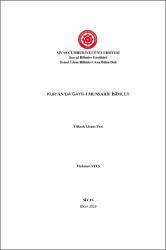| dc.contributor.advisor | Koçak, Süleyman | |
| dc.contributor.author | Ateş, Mahmut | |
| dc.date.accessioned | 2020-02-27T06:20:35Z | |
| dc.date.available | 2020-02-27T06:20:35Z | |
| dc.date.issued | 2019 | tr |
| dc.date.submitted | 2019-09-12 | |
| dc.identifier.other | V, 150 sayfa | |
| dc.identifier.uri | https://hdl.handle.net/20.500.12418/12252 | |
| dc.description.abstract | Arap dili ve belagatini canlı tutan ve günümüze kadar etkinliğini sürdürmesinde rol oynayan en büyük etken Kur’ân-ı Kerîm’dir. Arap diline mahsus konulardan biri olan birtakım isimlerin gayr-ı munsarif olmaları konusunda da Kur’ân-ı Kerîm, Arap dilinin bütün inceliklerini zarif ve hassas bir şekilde kullanmıştır.
Gayr-ı munsarif, sarfdan men edilmiş isim için kullanılan bir kavramdır. Sarfdan maksat ise tenvîndir. Araplar, isimlik konusunda kökleşmiş ve kuvvet kazanmış kelimeler için hafiflik alâmeti olarak tenvîn kullanırlar. Bu açıdan, isimlikten uzaklaşarak fiillere benzeyen kelimeler ağır kabul edilir ve tenvînden men edilirler. Fiil, isimden türediği için onun fer’i sayılmaktadır. Gayr-ı munsarif isimler de fiile benzediğinden dolayı gayr-ı munsarif kabul edilirler. Bu çalışmada gayr-ı munsarif konusu, gayr-ı munsarif isimler ve özellikleri dile getirildikten sonra Kur’ân-ı Kerîm’de gayr-ı munsariflik konusunun nasıl uygulandığı meselesi tespit edilmeye çalışılmıştır. Bu anlamda öncelikle bir veya iki illetle gayr-ı munsarif olduğu belirtilen kelimeler tespit edilmiş ve bu kelimelerin geçtiği âyetlere işaret edilmiştir. Birçok âyette gayr-ı munsarif kabul edilen kelimelerin kullanımına yer verildiği için çalışmanın sınırları düşünülerek gayr-ı munsarif kabul edilen kelimelerin geçtiği her âyetin metnine yer verilmemiştir. Bu maksatla gayr-ı munsarif kelimelerin geçtiği sûreler ve bu sûrede geçen âyet numaraları zikredilerek yetinilmiştir. | tr |
| dc.description.abstract | The most important factor that kept the Arabic language and eloquence alive and played a role in the continuation of its activity is the Qur’an. The Qur’an has used all the subtleties of the Arabic language in an elegant and delicate way in order that some of the names, which are specific to the Arabic language, be non-existent.Non-munsarif is a concept used for the name banned from consumables. The purpose of consumption is tenvîn. The Arabs use tenvin as a sign of lightness for the words that are rooted and gained strength in the name. In this respect, words that are similar to verbs by moving away from nouns are accepted as heavy and are banned from tenvîn.Since the verb derives from the name, it is deemed to be its individual. Since the non-munsarif names are similar to the verb, they are considered non-munsarif. In this study, the issue of non-munsarif, the names of non-munsarif and their characteristics are explained, and then the issue of how the subject of non-munsarif is applied in the Quran is tried to be determined.In this sense, first of all, one or two of the words that are specified to be non-munsarif identified and the verses of these words are pointed out. In many verses, since the use of words that are considered to be non-conscientious is included, the text of each verse that includes the words considered as non-conscientious is not included considering the limits of the study. For this purpose, the surahs where the non-munsarif words are passed and the verse numbers mentioned in this surah are satisfied. | tr |
| dc.language.iso | tur | tr |
| dc.publisher | Sivas Cumhuriyet Üniversitesi - Sosyal Bilimler Enstitüsü | tr |
| dc.rights | info:eu-repo/semantics/openAccess | tr |
| dc.subject | Arf | tr |
| dc.subject | Munsarif | tr |
| dc.subject | Gayr-ı Munsarif | tr |
| dc.subject | Tenvîn | tr |
| dc.subject | Sarfdan Men | tr |
| dc.subject | İllet | tr |
| dc.subject | Fiile Benzeme | tr |
| dc.title | Kur'ân'da Gayr-ı Munsarif İsimler | tr |
| dc.type | masterThesis | tr |
| dc.contributor.department | Sosyal Bilimler Enstitüsü | tr |
| dc.relation.publicationcategory | Tez | tr |















